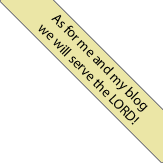Study of Zephaniah
Last night I was praying the Lord would show me what book I should next study in my morning devotions, when I came across the book of Zephaniah. I have a particular fondness for 'unused' Old Testament books (my favorites are Hosea and Habakkuk). Though I study the books of the New Testament thoroughly - Romans being the most frequented - I think it is crucial to study the God of the Old Testament in order to better understand the same God of the New Testament and today. It is truly amazing to think that He has been the same over the entire course of human history. He is "the Father of lights, with whom there is no variation or shadow of turning." (James 1:17)
Here are some of the notes I took from my research this morning...
- Zephaniah = "Yahweh [the Lord] hides"
- Prophet employs priestly vocabulary (1:4-5, 7-9; 3:4,18)
- No exclusive evidence that author was officially associated with the temple - Prophesied in southern kingdom during reign of Josiah (640-609 BC)
- Before or after Josiah's great reform (621 BC)? Unknown, but most likely before
- Ninevah had not yet been destroyed (2:13-15), therefore the prophet's message was spoken prior to its destruction in 612 BC. - Zephaniah would have been a contemporary of Jeremiah and may have been instrumental in bringing about Josiah's reforms - sins he attacked (1:4-6) were abolished by Josiah's reforms.
Focal Point: A foreign enemy - the Lord's sword of judgment - will inflict severe destruction upon Jerusalem. (Scythians? Assyrians? Babylonians?)
Zephaniah's treatment of the subject is extensive...
- The day is near (1:7).
- It will be a day in which the wrath and anger of Israel's sovereign Lord will be directed against the wicked (1:15, 18; 2:2,3).
- It is a day of darkness and gloom (1:15).
- So determined is the Lord to root out evil that He conducts a thorough search to ensure that the wicked will be found and destroyed (1:12).
- In that day pride will be vanquished (3:11) and the humble saved (3:12,17).
- The Gentiles will also come to faith in the true and living God and will "call on the name of the Lord" (3:9, Joel 2:32).
Second Point: The prophet's recognition og the importance of the Lord's covenant with His people (complaints against Judah reflect the Lord's anger at their neglect of the covenant obligations).
Zephaniah sees the judgment as transforming the world by bringing all people's works, both good and evil, under Divine scrutiny.
I realize some (if not most) of you are yawning by now, but for those of you who find this interesting - do I have any study partner volunteers?


7 Comments:
Those are excellent notes, Carey. It's wonderful that you care to "study" your Bible and that you ask God what he wants to teach you.
The Old Testament floors me. I find Genesis so mysterious, and I would often wonder how I would be able to get to Revelation if Genesis baffles me!
Enjoy your reading and your study, and please share if you come across any nugget.
The OT floors me too, but being the over-acheiver that I am, I love a challenge!
Still working my way up to Revelation. I've read it over and over, but need a ton of background info to understand it. Totally blows my mind.
So your not volunteering? *winks*
*you're
*bangs head*
Oh, sorry, I was yawning. lol, just teasing.
I'd love to partner up, not sure how much help I can be, but I will do my best!
It will just be fun to compare notes and discuss!
Any more volunteers?
I'm game! :) Just finished some time in Deuteronomy, so it's a good time to pick up a "new" book.
Hey. I just noticed the name Zephaniah is similar to Zaphanath Paaneah (the name of Joseph that Pharoah ascribed to him).
Post a Comment
<< Home